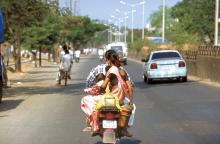The latest data from Sri Lanka reveals a massive rise in road accidents and the deaths. Finding the root cause is not straightforward however and may be many complex causes for this scenario. Key factors have been identified by local experts however and these include reckless driving without adequate road discipline, the absence of an effective procedure for issuing driving licenses and a lack of any training procedures for drivers as well as other road users. Other key problems include deficiencies in the
The latest data from Sri Lanka reveals a massive rise in road accidents and the deaths. Finding the root cause is not straightforward however and may be many complex causes for this scenario.
Key factors have been identified by local experts however and these include reckless driving without adequate road discipline, the absence of an effective procedure for issuing driving licenses and a lack of any training procedures for drivers as well as other road users. Other key problems include deficiencies in the strict enforcement of traffic laws on Sri Lankan highways, a high percentage of unroadworthy vehicles and poor road maintenance or lack of proper road signs. With regard to this last problem in particular Sri Lanka suffers from insufficient planning of road repairs. In 2010, the year for which the latest statistics are available, 2,721 people died and 26,847 people were injured due to road accidents in Sri Lanka. The highest number of deaths was in the 21-25 age group.
This causes special concern because many productive decades of these youths have been lost to the country, in addition to the personal loss to their families. To rectify this massive problem the authorities should take immediate measures to improve disciplined amongst drivers in the country. Statistics show that six persons die daily on Sri Lanka's roads while 85% of accidents occur due to the carelessness of drivers. Around 100-150 road accidents occur daily on average of which 45% are serious. This raises the issue of a strict procedure for driver testing and issuing of driving licenses. Local traffic experts comment that it is encouraging to note that action is being taken to introduce the driving license card using state-of-the-art smart card technology to capture and store driver information and streamline the process. The new smart card will introduce a points system to encourage drivers to obey road rules and minimise traffic violations. Experts say it is also crucial to focus on the fast growing numbers of driver training schools and the learners and plan to conduct a proper examination to select driving trainers. There are about 600 driving schools functioning throughout the island at present.
Key factors have been identified by local experts however and these include reckless driving without adequate road discipline, the absence of an effective procedure for issuing driving licenses and a lack of any training procedures for drivers as well as other road users. Other key problems include deficiencies in the strict enforcement of traffic laws on Sri Lankan highways, a high percentage of unroadworthy vehicles and poor road maintenance or lack of proper road signs. With regard to this last problem in particular Sri Lanka suffers from insufficient planning of road repairs. In 2010, the year for which the latest statistics are available, 2,721 people died and 26,847 people were injured due to road accidents in Sri Lanka. The highest number of deaths was in the 21-25 age group.
This causes special concern because many productive decades of these youths have been lost to the country, in addition to the personal loss to their families. To rectify this massive problem the authorities should take immediate measures to improve disciplined amongst drivers in the country. Statistics show that six persons die daily on Sri Lanka's roads while 85% of accidents occur due to the carelessness of drivers. Around 100-150 road accidents occur daily on average of which 45% are serious. This raises the issue of a strict procedure for driver testing and issuing of driving licenses. Local traffic experts comment that it is encouraging to note that action is being taken to introduce the driving license card using state-of-the-art smart card technology to capture and store driver information and streamline the process. The new smart card will introduce a points system to encourage drivers to obey road rules and minimise traffic violations. Experts say it is also crucial to focus on the fast growing numbers of driver training schools and the learners and plan to conduct a proper examination to select driving trainers. There are about 600 driving schools functioning throughout the island at present.







